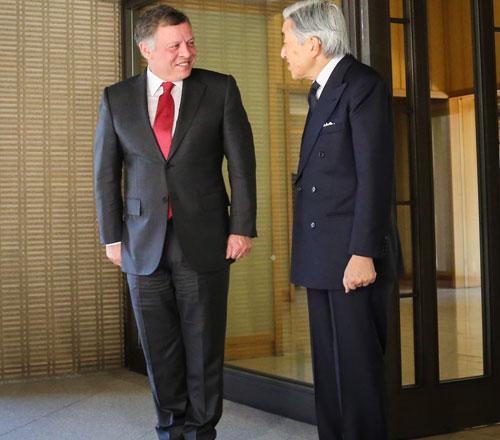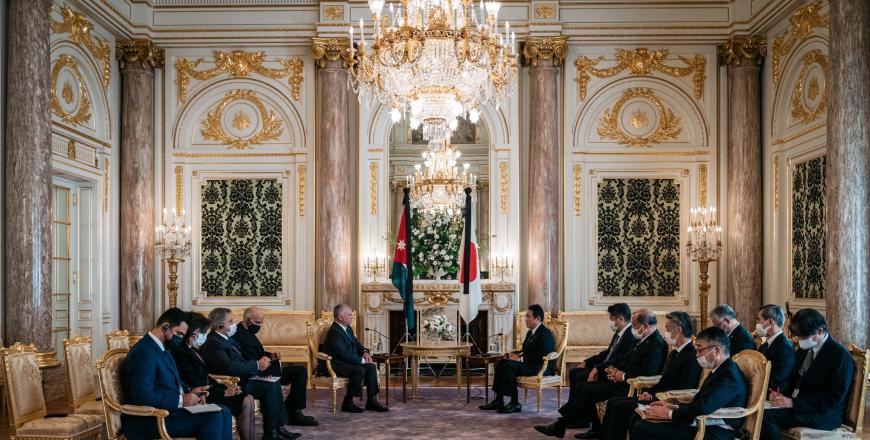You are here
Jordan, Japan to further better ties, promote peace
By JT - Nov 22,2014 - Last updated at Nov 22,2014

AMMAN — His Majesty King Abdullah on Saturday arrived home from a four-day working visit to Japan that started Tuesday, during which he met with Emperor Akihito, Prime Minister Shinzo Abe and other senior officials and top corporate executives.
During his meeting with Emperor Akihito and Empress Michiko, the two sides stressed the strong relations between the two countries and their commitment to strengthening them in the various fields, a Royal Court statement said.
Their Royal Highnesses Prince Ali and Prince Ghazi, the King’s personal envoy and adviser for religious and cultural affairs, attended the meeting.
The Royal visit asserted the strong relations between the two countries and represented a chance to highlight investment incentives in the Kingdom and to review regional developments, according to the Royal Court, as the two countries celebrate the 60th anniversary of the establishment of diplomatic relations.
At the conclusion of the visit, the two sides issued a joint communiqué outlining agreements and understandings reached following talks between His Majesty and Abe.
Following is the full text of the joint statement:
“The King of the Hashemite Kingdom of Jordan, His Majesty King Abdullah II ibn Al Hussein, visited Japan from November
18-21,2014 and met with Prime Minister of Japan Shinzo Abe on November 20.
Marking the 60th anniversary of diplomatic ties between Japan and Jordan, both sides renewed their commitment towards building on the good relations including the historical friendly ties between the Imperial Family and the Royal Family. Both sides reiterated their intention to further develop their strategic relationship and to continue cooperating towards promoting peace and stability.
Bilateral relations
Prime Minister Abe expressed his gratitude for Jordan’s continued support for Japan’s permanent membership in the United Nations Security Council and appreciated Jordan’s active representation of the Asia-Pacific group, as a non-permanent member at the UN Security Council until next year.
Prime Minister Abe greatly appreciated Jordan’s humanitarian assistance to Syrian refugees and announced Japan’s decision to provide Jordan with grant aid for rehabilitation and expansion of water networks in Balqa Governorate (2.238 billion yen), and the non-project grant aid for provision of Japanese SMEs products (200 million yen).
His Majesty King Abdullah II expressed his gratitude to Prime Minister Abe for Japan’s assistance to Jordan, both past and present, including a development policy loan of 12 billion yen provided in March this year, and for its support towards Syrian refugees and host countries which have amounted to over $400 million to date. Jordan requested a new development policy loan for the year 2015.
In understanding the difficult fiscal situation of Jordan imposed by instability in the region and the continued influx of Syrian refugees, Prime Minister Abe affirmed that Japan will continue extending its support to Jordan in close cooperation with the international community wherever possible. Both sides called on the international community to aid Syrian refugees and host countries in what is becoming the worst humanitarian crisis in modern history, noting the major pressure on host countries’ infrastructure, services and job opportunities as a result.
Both sides discussed increasing high level exchanges and strengthening policy consultations at the level of foreign ministers and senior officials of foreign ministries. Both sides also decided to expand defence relations and increase visits between the ministry of defence of Japan/Japan Self-Defence Forces and Jordanian Armed Forces officials.
Both sides emphasised the importance of active cultural cooperation considering the rich cultural heritage of both nations. In this regard, His Majesty King Abdullah II expressed gratitude for the recently signed cultural grant assistance for the construction of the Petra Museum (686.2 million yen) provided by Japan this year. The museum is set for inauguration in 2016.
His Majesty King Abdullah II expressed admiration of Japanese companies’ experience and technological advances in the fields of nuclear and renewable energy. Anticipating enhanced business activities by Japanese corporations in Jordan, His Majesty expressed his support and encouragement to Japanese corporations’ work.
Both sides welcomed increasing mutual cooperation between the two countries in various fields, including the field of sports, and welcomed the conclusion of a partnership agreement between the Japan Football Association and Jordan Football Association. His Majesty welcomed Prime Minister Abe’s expression of intent to reinforce bilateral sports exchanges through the “Sport for Tomorrow” programme.
Both sides recognised that empowerment of women is vital to realise sustainable and healthy economic development, and confirmed to promote cooperation in this regard.
Cooperation for regional and international peace and stability
Prime Minister Abe explained the policy of “Proactive Contribution to Peace” based on the principle of international cooperation and Japan’s efforts including the development of seamless security legislation based on the Cabinet decision on July 1. In response, His Majesty King Abdullah II welcomed Japan’s contribution to regional and international peace, stability and prosperity and expressed support for Japan’s security policy.
Prime Minister Abe expressed great appreciation to His Majesty King Abdullah II on Jordan’s important role and contributions for peace and stability in the Middle East, particularly the Middle East peace process. His Majesty commended Japan’s supportive role in the peace process and expressed appreciation in particular for Japan’s important “Corridor for Peace and Prosperity” initiative and discussed how it can serve to promote peace in the region. Both sides reaffirmed their commitment towards working together and other international partners to realise the initiative’s goals.
Both sides expressed concern regarding the recent increase in violence and called on the Israeli and Palestinian sides to return to negotiations to reach a final “two-state solution” where Israel and a future independent Palestinian State live side-by-side in peace and security, based on the Arab Peace Initiative and relevant UN resolutions.
Both sides called for halting unilateral actions that can increase violence and minimise hope for a final peaceful settlement, including continued settlement construction and any moves to change the status quo in Jerusalem and its holy sites.
Both sides shared recognition that any unilateral attempt to change the status quo by use of force or coercion in the international community is not acceptable. In addition, they reaffirmed the importance of peace and stability, unimpeded lawful commerce and the freedoms of navigation in and overflight over the high seas.
Both sides expressed their concern about the situation in Syria, and stressed the importance of improving the humanitarian situation as well as achieving a political solution on the basis of the Geneva Communiqué of June 30, 2012.
Both sides condemned terrorism in all its forms and manifestations. They emphasised that the evolving character of terrorism called for stronger international partnership in combating terrorism, including through increased sharing of information and intelligence.
Both sides shared recognition that ISIL is a serious threat to the international order and that joint effort among the international community is necessary on a wide range of fields including the issue of foreign terrorist fighters in order to counter its threat.
Prime Minister Abe supported and highly appreciated Jordan’s efforts to tackle the threat of ISIL and its pre-eminent role in combating extremist ideology through various inter- and intra-faith initiatives such as the Amman Message, A Common Word and Interfaith Harmony Week. His Majesty highly appreciated Japan’s counter-terrorism efforts including humanitarian assistance for Iraq, Syria and neighbouring countries. Both sides confirmed their intention to continue cooperation.
Both sides exchanged views on the wider security environment in East Asia and confirmed the importance of maintaining peace and stability in the Asia-Pacific region in accordance with international law.
The two sides reaffirmed the importance of nuclear disarmament, a Middle East zone free of nuclear weapons and all other weapons of mass destruction and non-proliferation and expressed willingness to continue cooperating in this field, especially aiming for a successful outcome of 2015 NPT Review Conference, noting the importance of the universalisation of the NPT.
The two sides also expressed their intention to bolster cooperation in addressing North Korea’s continued development of nuclear weapons and ballistic missile programmes as well as the abductions issue. They also reaffirmed the importance of maintaining security and stability in the Korean Peninsula through peaceful means in accordance with UN resolutions.
Prime Minister Abe highly appreciated Jordan’s active and dedicated contribution in the field of Peacekeeping Operations (PKO). His Majesty King Abdullah II greatly appreciated Japan’s high-quality activities in this field. Both sides expressed their intention to strengthen cooperation in PKO, including exchanges of instructors between the PKO training centre in Jordan and related PKO offices in Japan.
Both sides shared the intention to work more actively to achieve concrete outcomes on Security Council reform including the expansion of both the permanent and non-permanent categories in 2015.
?In the field of global challenges such as climate change, environmental issues and disaster risk reduction, both sides recognised the importance of addressing pressing global challenges including the formulation of the post-2015 development agenda based on the principle of human security and cooperation towards a new international framework at COP21 (UN Climate Change Conference), and reaffirmed further cooperation to cope with these challenges. Both sides also affirmed active participation in and close cooperation for the Third World Conference on Disaster Risk Reduction to be held in Sendai, Japan, in March 2015.”
Related Articles
AMMAN — His Majesty King Abdullah on Tuesday met in Tokyo with Japan Prime Minister Kishida Fumio, and discussed the deep-rooted ties of fri
AMMAN — His Majesty King Abdullah and Japanese Prime Minister Abe Shinzo on Thursday stressed the importance of maintaining bilate
AMMAN — His Majesty King Abdullah’s talks with Japanese Prime Minister Shinzo Abe in Tokyo on Tuesday focused on opportunities to advance po













